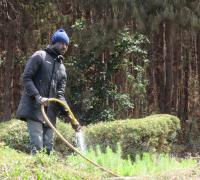Timber Rush research program launched at DIIS
The Southern Highlands in Tanzania is undergoing a virtual timber rush these years. A high demand for wood products from the construction sector in the country’s booming cities has led to feverish activity in the forest sector. In rural areas, this is accompanied by a rush for land for tree-planting. Most of this is done by small investors. Some are locals, who invest plant tree seedlings on their own land. But a host of small and medium scale investors from Tanzania’s urban centres have also bought up village land. The prospect of harvesting a profit from timber has changed the socio-economic dynamics in this south-western part of the East African country.
A new Timber Rush research program is now being launched to research the tree-planting phenomenon in the Southern Highlands. Much research has focused on deforestation and illegal logging in sub-Saharan Africa. The Timber Rush program will look at the dynamics related to afforestation. Through a focus on the drivers related to the timber value chain as well as the dynamics around land and livelihoods, it will investigate who these investors are and how they impact the local level. Large-scale plantation forests play a part in the Timber Rush, but the major drivers are the multitude of smaller domestic investors.
The Timber Rush is a five-year (2016-20) collaborative research program between Sokoine University of Agriculture (SUA) in Tanzania, the Danish Institute for International Studies (DIIS) and Copenhagen University in Denmark. It involves eight researchers and two PhD students. It is funded by a grant from the Consultative Research Committee for Development Research (FFU) under Danida.
DIIS Experts



